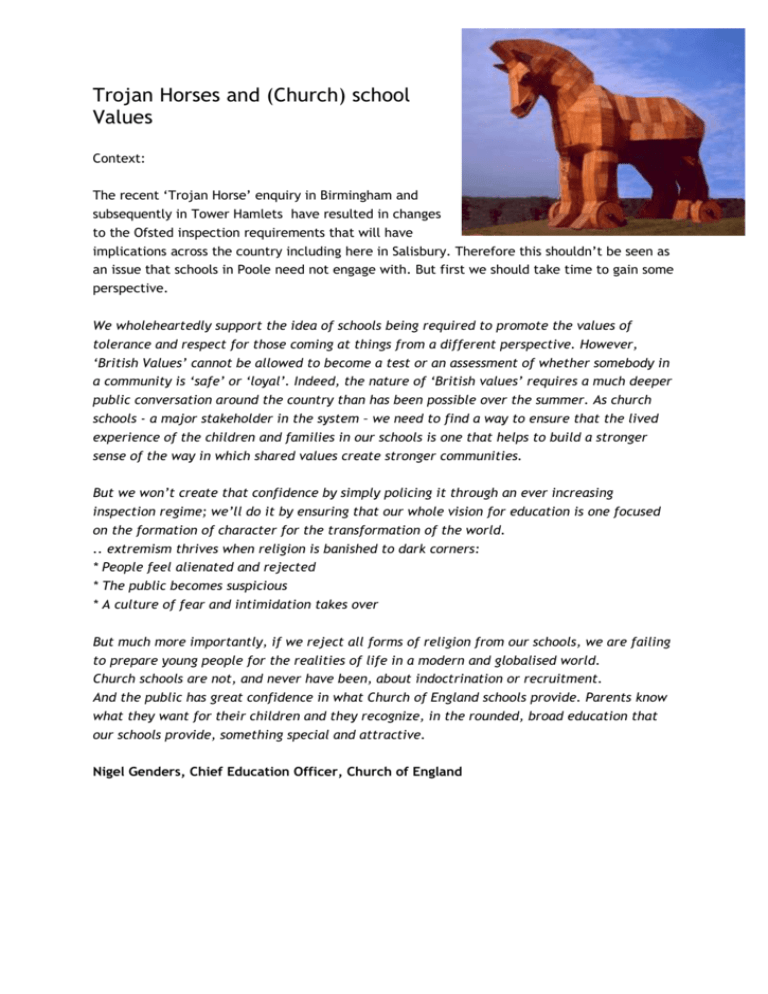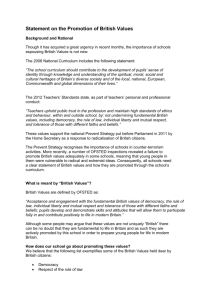Trojan Horses and (Church) School Values
advertisement

Trojan Horses and (Church) school Values Context: The recent ‘Trojan Horse’ enquiry in Birmingham and subsequently in Tower Hamlets have resulted in changes to the Ofsted inspection requirements that will have implications across the country including here in Salisbury. Therefore this shouldn’t be seen as an issue that schools in Poole need not engage with. But first we should take time to gain some perspective. We wholeheartedly support the idea of schools being required to promote the values of tolerance and respect for those coming at things from a different perspective. However, ‘British Values’ cannot be allowed to become a test or an assessment of whether somebody in a community is ‘safe’ or ‘loyal’. Indeed, the nature of ‘British values’ requires a much deeper public conversation around the country than has been possible over the summer. As church schools - a major stakeholder in the system – we need to find a way to ensure that the lived experience of the children and families in our schools is one that helps to build a stronger sense of the way in which shared values create stronger communities. But we won’t create that confidence by simply policing it through an ever increasing inspection regime; we’ll do it by ensuring that our whole vision for education is one focused on the formation of character for the transformation of the world. .. extremism thrives when religion is banished to dark corners: * People feel alienated and rejected * The public becomes suspicious * A culture of fear and intimidation takes over But much more importantly, if we reject all forms of religion from our schools, we are failing to prepare young people for the realities of life in a modern and globalised world. Church schools are not, and never have been, about indoctrination or recruitment. And the public has great confidence in what Church of England schools provide. Parents know what they want for their children and they recognize, in the rounded, broad education that our schools provide, something special and attractive. Nigel Genders, Chief Education Officer, Church of England What is Ofsted doing? Ofsted will be covering this under Leadership and management and specifically under SMSC (Spiritual Moral Social and Cultural development) 130. In judging the school’s overall effectiveness, inspectors consider whether: • the school requires improvement as it is not a good school because one or more of the four key judgements requires improvement (grade 3) and/or there are weaknesses in the overall provision for pupils’ spiritual, moral, social and cultural development The key change has come under the definition of social development and in particular the last bullet point highlighted 131. The social development of pupils is shown by their: • use of a range of social skills in different contexts, including working and socialising with pupils from different religious, ethnic and socio-economic backgrounds • willingness to participate in a variety of communities and social settings, including by volunteering, cooperating well with others and being able to resolve conflicts effectively • acceptance and engagement with the fundamental British values of democracy, the rule of law, individual liberty and mutual respect and tolerance of those with different faiths and beliefs; the pupils develop and demonstrate skills and attitudes that will allow them to participate fully in and contribute positively to life in modern Britain Ofsted have found it very difficult to ‘inspect’ such a vague politicians term as ‘Fundamental British values’ and so are falling back on ‘Preparing pupils for life in modern Britain’. There is also a safeguarding issue here (Which enables ofsted to inspect private faith schools!). Are pupils being protected from extremism and given information to challenge extreme practice? So for Poole schools there needs to be evidence that they are preparing pupils for life in modern Britain and that they have sufficiently robust systems in place to risk assess any opportunities for indoctrination. Be Prepared First the good news is that • • If the school has a strong ethos based on ( Christian) values that have been thought through and are embedded across the curriculum you probably have most of this covered , you might just need to articulate a link from these to fundamental British values If you have been involved in the Rights Respecting School programme you will have evidence to track your coverage of ‘fundamental British values’ But here are some starting points or other actions your school might consider taking First check your website. This is where Ofsted will start. They will increasingly expect to see your taught curriculum up there. Does this give evidence of how you are preparing pupils for life in modern Britain? Think it through. Make sure that school is clear, articulate, and risk assessed about your position and context. If you can show that the school has thought about this issue and identified how it impacts on our rural context then you are half way there. Are Staff, SLT, Governors clear about the ‘new’ language being used - Make sure everyone is up to speed. This is not just an issue for RE. It is worth noting that in this case ‘the buck stops with the governors’ they will be deemed to have failed to ensure the SMSC development of pupils. They must be part of this conversation. Make sure all Staff understand the new emphases in Curriculum, SMSC, British values and Behaviour and Safety. (Ofsted will see TA‘s as well as teaching staff). The taught curriculum is perhaps where we are most at risk in a rural context. Preparing pupils for life in modern Britain means making sure pupils are aware that we are a multi cultural multi faith society. There will be an expectation that pupils have meaningful experiences of diversity of the UK. That it is difficult and expensive will be taken as an excuse not a defence. You probably can’t win this one so take it on the chin. Developing pupil voice around Ofsted expectations. Ofsted will interview pupils and will ask about their attitudes to diversity. No one will blame the school if pupils bring in their parents attitudes but you need to be aware of what they might say and how you are countering unfortunate attitudes. Conversations with PSHEE/Behaviour co-ordinators: These need to be on board Safeguarding – risk assessing school context. There is unlikely to be major problem with FGM in many Dorset Villages but who is likely to express extreme or intolerant views? Do they do that in school? Is Collective worship provision: have you a system for checking and feeding back to those leading Worship. Have you thought through where (Christian) values might conflict with British values of democracy and tolerance?






![afl_mat[1]](http://s2.studylib.net/store/data/005387843_1-8371eaaba182de7da429cb4369cd28fc-300x300.png)

